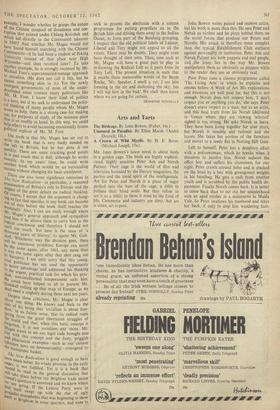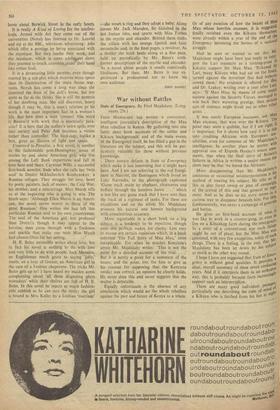Arts and Tarts
Ma. Joint BOwEN's latest novel is about birds in a golden cage. The birds are highly sophisti- cated, highly sensitive Peter Ash and Norah Palmer. Their cage is the world of film and television bounded by the literary magazines, the parties and the timid spirit of the intelligentsia. Art for Peter and Norah is a piece of sugar pushed into the bars of the cage, a titbit to palliate their hired souls. But they refuse to see it as a titbit; to them it must be the food of life. Commerce and industry are dirty, but art is clean, art is pure. John Bowen writes poised and incisive satire, but his work is more than this. He sees Peter and Norah as victims and he plays behind them on the social forces that produce our Peters and Norahs. His attack is therefore more complex than the typical Establishment Club outburst against personality or institution. Peter Ash and Norah Palmer are both puppets and real people, and the irony lies in the way Mr. Bowen manipulates them so obviously as puppets while to the reader they are so obviously real.
Poor Peter runs a cinema programme called `The Living Arts' in which he explains and emotes before A Work of Art. His explanations and emotions are well paid for, but this is not enough. Norah does not respect him. 'I don't respect you or anything you do,' she says. Peter doesn't crave respect as a man, but as an artist, and this final truth from his Norah (delivered in Venice where they are viewing 'selected' sights)' is too strong. He asks Norah to leave. They have been living together for nine years, but Norah is sensible and rational and she leaves. She takes her portion of the furniture and moves to a seedy flat in Notting Hill Gate.
Left to himself, Peter has a desultory affair with a policewoman, which he breaks when it threatens to involve him. Norah seduces the office boy and suffers his clumsiness for one night. Peter crawls around Soho and is cracked on the head by a boy with greengrocer weights in his handbag. He gets a rash from another youth and is scrubbed by the public health de- partment. Finally Norah comes back. It is better to come back than to eat out her spinsterhood with an aged mother in a maisonette in Maida Vale. So Peter swallows his manhood and takes her back, if only to stop him wandering foot- loose about Berwick Street in the early hours.
It is really A Kind of Loving for the intellec- tuals. Armed with Art they come out of the universities (Norah has listened to Dr. Leavis) and sip at the BBC, television, advertising: jobs which offer a prestige by being associated with the mystique, But they loathe their work, and the mystique, which in some adolevnt dawn they yearned to touch, crumbles under their hand like rotten fruit.
It is a devastating little parable, even though marred by a sub-plot which receives more space than its illumination of the main theme war- rants. Norah has come a long way since she slammed the door of the doll's house, but not quite as far as she thinks. She is still the nemesis of her doubting man. She still discovers, hoary though it may be, that a man's relation to his work is the most important fact in a woman's life. But how does a man `connect' (the word is Bowen's) with work that is essentially para- sitic? It is here that the author's satire spills over into society and Peter Ash becomes a victim rather than controller. The bird-cage, unlike a box, gives an illusion of light and space.
Unarmed in Paradise, a first novel, is another in the fashionable post-Hemingway series of stories by and about American girls who live among the Left Bank expatriates and fall in love here and there. Carmian Wills, a successful first-book novelist, finds what she calls her 'twin soul' in Dmitri Mikhailovitch Koubyankov, a Russian refugee. They struggle for love, beset by poets, painters, lack of money, the Cold War, his mother, and a miscarriage. Miss Marsh tells us at the beginning who is going to win. The blurb says: `Although Ellen Marsh is an Ameri- can, her novel seems nearer to those of the great Russians.' One wishes she had left this particular Russian soul to his own countrymen. The soul of the American girl, less profound than Dmitri's though it may appear to the heroine, does come through with a freshness and sparkle that make one wish Miss Marsh had chosen Ohio for her setting.
H. E. Bates ostensibly writes about love, but in fact his novel is nothing to do with love and very little to do with people. Jack Marsden, an Englishman much given to saying 'jolly,' meets, on a tour of Greece, an American girl in the care of a Lesbian chaperone. The tricks Mr. Bates gets up to! I have heard my maiden aunts complaining about `all those disgusting plays nowadays' while their shelves are full of H. E. Bates. In this novel he injects as much fashion- able rubbish as he can into the story: the girl is bound to Mrs. Keller by a Lesbian 'marriage' —she wears a ring and they adopt a baby. Along comes Mr. Jack Marsden, Sir Galahad in the hot Ionian isles, and sports with Miss Forbes in the myrtle and oleander. Behind them stalks the villain with her orange lipstick and faint moustache and, in the final pages, a revolver. As a thriller the book beats along at a fine pace, held up periodically by Mr. Bates's sixth- former descriptions of the myrtle and oleander. As a novel about people it smells contrivedly libidinous. But then, Mr. Bates is too ex- perienced a professional not to know his own audience.
JOHN DANIEL







































 Previous page
Previous page